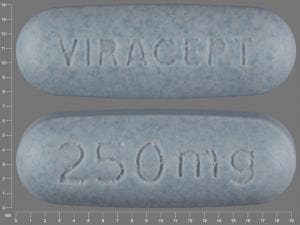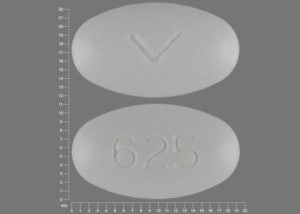What is Viracept?
Viracept is a prescription anti-HIV medicine used with other anti-HIV medicines to treat human immunodeficiency virus (HIV-1) infection. Viracept is a type of anti-HIV medicine called a protease inhibitor. HIV-1 is the virus that causes AIDS (Acquired Immune Deficiency Syndrome).
When used with other HIV medicines, Viracept may help reduce the amount of HIV in your blood (called "viral load"). Viracept may also help to increase the number of white blood cells called CD4 (T) cells, which help fight off other infections. Reducing the amount of HIV and increasing the CD4 (T) cell count may improve your immune system. This may reduce your risk of death or infections that can happen when your immune system is weak (opportunistic infections).
It is not known if Viracept is effective in children less than 2 years of age.
Viracept does not cure HIV infection or AIDS, and you may continue to experience illnesses associated with HIV-1 infection, including opportunistic infections. You should remain under the care of a doctor when using Viracept.
Patients must stay on continuous HIV therapy to control infection and decrease HIV-related illness
Avoiding doing things that can spread HIV-1 infection.
- Do not share needles or other injection equipment
- Do not share personal items that can have blood or body fluids on them, like toothbrushes and razor blades.
- Do not have any kind of sex without protection. Always practice safe sex by using a latex or polyurethane condom to lower the chance of sexual contact with semen, vaginal secretions, or blood.
Ask your healthcare provider if you have any questions on how to prevent passing HIV to other people.
What is the most important thing I should know about Viracept?
Viracept can interact with other medicines and cause serious side effects. It is important to know the medicines that should not be taken with Viracept. See the section "Who should not take Viracept?"
Who should not take Viracept?
Do not take Viracept if you take any of the following medicines:
- alfuzosin (Uroxatral)
- amiodarone (Pacerone, Cordarone)
- cisapride (Propulsid, Propulsid Quicksolv)
- ergot, including:
- dihydroergotamine mesylate (D.H.E. 45, Migranal)
- ergotamine tartrate (Cafergot, Migergot, Ergomar, Ergostat, Medihaler Ergotamine, Wigraine, Wigrettes)
- methylergonovine maleate (Methergine)
- lovastatin (Advicor, Altoprev, Mevacor)
- lurasidone (Latuda)
- oral midazolam (Versed)
- pimozide (Orap)
- quinidine (Quinaglute, Cardioquin, Quinidex, Quinora)
- rifampin (Rifadin, Rifamate, Rifater, Rimactane)
- sildenafil (Revatio) when used to treat pulmonary arterial hypertension
- simvastatin (Zocor, Vytorin, Simcor)
- St. John's wort (Hypericum perforatum)
- triazolam (Halcion)
Serious problems can happen if you or your child take any of these medicines with Viracept.
What should I tell my healthcare provider before taking Viracept?
Before taking Viracept, tell your healthcare provider if you:
- have liver problems
- have kidney problems
- have phenylketonuria. Viracept contains aspartame.
- have high blood sugar (diabetes)
- have hemophilia
- have any other medical condition
- are pregnant or plan to become pregnant. It is not known if Viracept will harm your unborn baby.
Pregnancy Registry. There is a pregnancy registry for women who take antiviral medicines during pregnancy. The purpose of the registry is to collect information about the health of you and your baby. Talk to your healthcare provider about how you can take part in this registry. - Do not breastfeed. We do not know if Viracept can be passed to your baby in your breast milk and whether it could harm your baby. Also, mothers with HIV-1 should not breastfeed because HIV-1 can be passed to the baby in the breast milk.
Tell your healthcare provider about all the medicines you take, including prescription and non-prescription medicines, vitamins and herbal supplements. Using Viracept with certain other medicines may affect each other and cause serious side effects. Viracept may affect the way other medicines work, and other medicines may affect how Viracept works.
Especially tell your healthcare provider if you take:
- medicine to treat HIV
- atorvastatin (Lipitor)
- azithromycin (Zmax, Zithromax)
- bosentan (Tracleer)
- carbamazepine (Carbatrol, Equetro, Tegretol)
- colchicine (Colcrys)
- didanosine (Videx, Videx EC). Take Viracept with food one hour after or more than two hours before you take didanosine.
- estrogen-based contraceptives (birth control pills). Viracept may reduce the effectiveness of estrogen-based contraceptives. During treatment with Viracept, you should use a different method of birth control or a second method of birth control method along with your hormone-based birth control. Talk to your healthcare provider about what types of birth control you can use to prevent pregnancy while taking Viracept.
- fluticasone (Advair Diskus, Advair HFA, Flovent, Flovent HFA, Flovent Diskus, Flonase, Veramyst)
- immunosuppresnts such as cyclosporine (Gengraf, Sandimmune, Neoral), tacrolimus (Prograf), sirolimus (Rapamune)
- methadone hydrochloride (Dolphine hydrochloride)
- midazolam administered by injection (Versed)
- omeprazole (Prilosec)
- phenobarbital
- phenytoin (Dilantin, Phenytek)
- quetiapine (Seroquel)
- rifabutin (Mycobutin)
- rosuvastatin (Crestor)
- salmeterol (Serevent)
- sildenafil (Viagra), vardenafil (Levitra) or tadalafil (Cialis), for the treatment of erectile dysfunction (ED).
- tadalafil (Adcirca) for the lung problem pulmonary arterial hypertension (PAH)
- warfarin (Coumadin, Jantoven)
Ask your healthcare provider or pharmacist if you are not sure if your medicine is one that is listed above.
Know the medicines you take. Keep a list of them to show your healthcare provider or pharmacist when you get a new medicine.
How should I take Viracept?
- You should stay under a healthcare provider's care when taking Viracept.
- Take Viracept every day exactly as prescribed by your healthcare provider
- Do not change your dose of Viracept or stop treatment without talking to your healthcare provider first.
- Take Viracept with a meal.
- Viracept is usually taken 2 or 3 times each day. Your healthcare provider will tell you how much Viracept to take and when to take it.
- If your child is taking Viracept, your child's healthcare provider will decide the right dose based on your child's weight.
- Viracept Tablets are film-coated to help make the tablets easier to swallow.
- If you or your child are unable to swallow the tablets:
- You may dissolve the tablets in a small amount of water. Once the tablets are dissolved, the liquid will be cloudy.
- Mix the cloudy liquid well, and then drink it right away.
- Rinse the glass with water and drink the water to ensure that you take the full dose of Viracept.
- If you miss a dose of Viracept, take it as soon as possible. If you skip a dose, do not double the next dose.
- If you take too much Viracept, call your healthcare provider or go to the nearest hospital emergency room right away.
- Do not run out of Viracept. Get your Viracept refilled from your doctor or pharmacy before you run out.
What are the possible side effects of Viracept?
Viracept can cause serious side effects, including:
- Diabetes and high blood sugar (hyperglycemia). Some people who take protease inhibitors including Viracept can get high blood sugar, develop diabetes, or your diabetes can get worse. Tell your healthcare provider if you notice an increase in thirst or urinate often while taking Viracept.
- Increased bleeding in people with hemophilia. Some people with hemophilia have increased bleeding with protease inhibitors including Viracept.
- Changes in body fat. These changes can happen in people who take antiretroviral therapy. The changes may include an increased amount of fat in the upper back and neck ("buffalo hump"), breast, and around the back, chest, and stomach area. Loss of fat from the legs, arms, and face may also happen. The exact cause and long-term health effects of these conditions are not known.
- Changes in you immune system (Immune Reconstitution Syndrome) can happen when you start taking HIV medicines. Your immune system may get stronger and begin to fight infections that have been hidden in your body for a long time. Call your healthcare provider right away if you start having new symptoms after starting your HIV medicine.
Common side effects of Viracept in adults include:
- Diarrhea. Tell your healthcare provider if you get diarrhea with Viracept. You may be able to take loperamide or another non-prescription medicine to help control your diarrhea.
- nausea
- gas
- rash
Common side effects in children include:
- Diarrhea. Tell your healthcare provider if your child gets diarrhea with Viracept. Your child may be able to take loperamide or another non-prescription medicine to help control your diarrhea.
- low white blood cell count (leukopenia and neutropenia)
- rash
- loss of appetite
- stomach-area (abdominal) pain
Tell your healthcare provider if you have any side effect that bothers you or that does not go away.
These are not all the possible side effects of Viracept. For more information, ask your healthcare provider or pharmacist.
Call your doctor for medical advice about side effects. You may report side effects to FDA at 1-800-FDA-1088.
Viracept Images
General information about the safe and effective use of Viracept
Medicines are sometimes prescribed for purposes other than those listed in a Patient Information leaflet. Do not use Viracept for a condition for which it was not prescribed. Do not give Viracept to other people, even if they have the same symptoms that you have. It may harm them.
This leaflet summarizes the most important information about Viracept. If you would like more information, talk with your healthcare provider. You can ask your pharmacist or healthcare provider for information about Viracept that is written for health professionals.
For more information, call 1-800-438-1985.
How should I store Viracept?
- Store Viracept Tablets at room temperature, between 59ºF to 86ºF (15ºC to 30ºC).
- Store Viracept in the original container.
- Keep the container closed tightly.
Keep Viracept and all medicines out of the reach of children.
What are the ingredients in Viracept?
Active ingredient: nelfinavir mesylate
Tablet inactive ingredients: calcium silicate, crospovidone, magnesium stearate, hypromellose, and triacetin. In addition, the 250 mg tablet contains FD&C blue #2 powder and the 625 mg tablet contains colloidal silicon dioxide.






